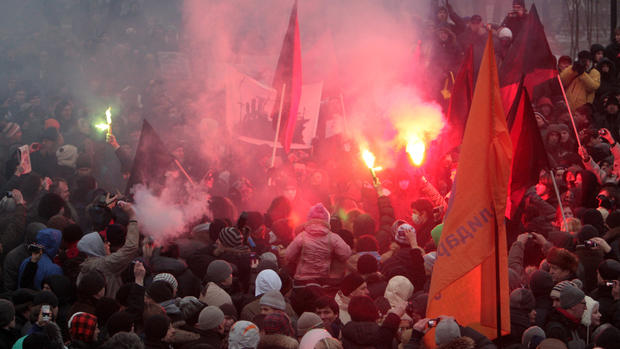Russia's fragile opposition struggles for unity
MOSCOW - Russia's opposition, riding high after the largest anti-Kremlin protests in 20 years, has a big problem to overcome: It's a fragile patchwork of groups whose leaders inspire little trust among voters.
That's sowing doubts that opposition leaders will be able to move beyond popular disgruntlement and form a political force that can put on a credible show against Prime Minister Vladimir Putin in presidential elections next March.
Putin loyalist resigns as parliament speaker
Russian billionaire, NBA owner, challenges Putin
Day of massive protests in Russia
Some of these leaders are seen as has-beens eager to resurrect their political careers, many are inexperienced, and others tilt to the radical or racist side.
Tens of thousands of Russians gathered on Saturday just across the river from the Kremlin where they chanted slogans and accused authorities of ballot-stuffing and other violations in the Dec. 4 parliamentary election that saw Putin's United Russia party lose about 20 percent of its seats and barely retain a majority.
Dozens of speakers took their turns at an improvised podium to address the protesters. They represented a diverse crowd of often competing political groups united only by their dissatisfaction with the government.
With such a glaring lack of unity and charisma, many are wondering whether last weekend's protests, which took place in more than 60 other cities countrywide, might fizzle out as the frigid Russian winter drags on and Kremlin strategists work overtime at dividing the opposition even further.
The one Kremlin critic who seems to have a shot at consolidating the disparate opposition voices is Alexei Navalny, Russia's leading corruption whistleblower.
His one-man crusade against Russia's state-owned companies made him immensely popular. Tens of thousands follow Navalny's blog and website tracking suspicious government business.
"The only opposition leader who stands any chance is Navalny. Period," said author and analyst Yulia Latynina.
Authorities seem to understand Navalny's potential, which could explain why he missed Saturday's rally due to a 15-day jail sentence for attending an earlier rally to protest election results.
Navalny, co-founder of a moderately nationalist party, coined the popular epithet for United Russia — "the party of crooks and thieves" — that has become a common sight on protest T-shirts and banners.
However, Navalny's image — at least for liberals — was tarnished in early November when he participated in a "Russian March," a rally that united several thousand ultranationalists and racists.
An organizer of many recent protests, Sergei Udaltsov, was also behind bars and unable to attend Saturday's rally. Udaltsov, the 34-year-old leader of a leftist group, was serving a 15-day arrest for disobeying police.
Other opposition leaders known for their criticism of Kremlin policies include Mikhail Kasyanov, who was prime minister during Putin's first presidential term, and Boris Nemtsov, who briefly served as a deputy premier during President Boris Yeltsin's presidency.
Kasyanov, who was fired in 2004, is a leader of Other Russia, a loose alliance of opposition groups that have been denied official registration for years and thus a chance to field its candidates in elections. He has become a fierce Kremlin critic but enjoys little public support, due in part to allegations of his involvement in government corruption.
Nemtsov and Kasyanov are "figures from the '90s, and the narrative of chaos of that period is still strong," said Alex Nice, a Russia analyst at the London-based think tank Chatham House. "What is needed is new faces who can give new ideas."
Eduard Limonov, one of the most radical and eccentric Kremlin critics, chose not to show up at the massive Saturday rally and led about 150 supporters to hold a separate protest near the Red Square.
Limonov, a novelist and leader of the banned National Bolshevik party, complained that his calls for a takeover of the Russian parliament building were ignored by protesters and even police.
"Pied Pipers took the citizens away," he wrote about other opposition leaders. "We missed a historic opportunity."
Another challenger who stayed out of Saturday's rally is Mikhail Prokhorov, the billionaire owner of the New Jersey Nets basketball team. Although Prokhorov is a symbol of success among Russia's emergent business class — his fortune is estimated by Forbes magazine at $18 billion — his wealth is likely to distance him from ordinary Russians.
On Wednesday, Prokhorov announced he plans to buy the Kommersant publishing house, an acquisition that would give him a major campaign platform — if the Kremlin allows him to use it. The holding includes Russia's top business daily, popular weeklies, radio and television broadcasters.
In a broader sense, the very possibility of a united opposition in Russia is questionable. The Kremlin has been very adroit at dismantling potentially powerful opposition groups or individuals. A prominent example is tycoon Mikhail Khodorkovsky, who has been in jail since 2003 on tax evasion and embezzlement charges widely seen as a punishment for having defied Putin's domination.Under Putin, the election law was amended to establish a 7 percent threshold for parliamentary elections, which effectively blocks out liberal parties and independents from getting into the legislature. As a result, only four parties will be represented in the next Duma.
Also, independent presidential candidates such as Prokhorov face a tough challenge collecting 2 million signatures in order to qualify for the race, a draconian provision that makes it easy for authorities to deny them registration on technical grounds.
"The Kremlin has different techniques to respond to the opposition," said Stefan Meister, an analyst at the German Council on Foreign Relations, a Berlin think tank. "They just integrate dangerous people ... or they react very harshly and make it impossible to create a new organization."
